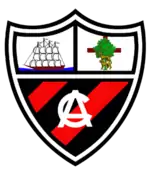Arenas Club de Getxo
Arenas Club de Getxo is a Spanish football club based in the town of Getxo, near Bilbao, in the autonomous community of Basque Country. Founded in 1909, it currently plays in Segunda División B – Group 2, holding home games at Campo Municipal de Gobela, with a 2,000-seat capacity.[2]
 logo | |||
| Full name | Arenas Club de Getxo | ||
|---|---|---|---|
| Nickname(s) | El Histórico | ||
| Founded | 1909 as Arenas Foot-ball Club | ||
| Ground | Gobela, Getxo, Basque Country, Spain | ||
| Capacity | 2,000[1] | ||
| President | Francisco Javier Egusquiaguirre | ||
| Head coach | Javier Olaizola | ||
| League | 2ªB – Group 2 | ||
| 2019-20 | 2ªB – Group 2, 18th | ||
|
| |||
It was among the pioneering clubs of Spanish football, and in 1928 was a founding member of La Liga, alongside neighbouring Athletic Bilbao, Real Sociedad and Real Unión.
History
Founded in 1909 as Arenas Football Club, it became Club Arenas three years later. In 1914 the club played a series of three friendlies against FC Barcelona, winning all games.
The team subsequently competed in the Campeonato Norte along with Real Sociedad, Athletic Bilbao, Racing de Santander, Sporting de Gijón and Celta de Vigo, being crowned champion in 1917, and qualifying to the Copa del Rey, where it reached the final in Barcelona, losing 1–2 against Madrid FC after extra time.
In 1919 Arenas won another regional competition, the Campeonato de Vizcaya, thus qualifying for the Copa del Rey again, and won the national tournament after disposing of FC Barcelona in overtime (5–2). The following year, when Spain made its international debut at the Olympic Games in Antwerp, the squad included two players from the club, Francisco Pagazaurtundúa and Félix Sesúmaga.
Arenas Getxo appeared in Spanish Cup finals on two further occasions, losing against Barcelona in 1925 (0–2) and two years later against Real Unión (0–1), the latter in the only all-Basque decisive match in the competition's history not to feature Athletic Bilbao.[3][4] Every member of the Spanish squad at the 1928 Olympics was with a Basque club, and Arenas provided four of the players.
After playing in La Liga's first seven editions – finishing third in 1929–30 – and the following six seasons in the second division, the club has spent the vast majority of its existence competing at the fourth level, with the occasional visit to the regional leagues. In 2015, Arenas gained promotion to the third tier for the first time in 35 years, via the playoffs.[5]
Season to season
|
|
|
|
|
- 7 seasons in La Liga
- 6 seasons in Segunda División
- 6 seasons in Segunda División B
- 62 seasons in Tercera División
- 9 seasons in the Regional Leagues
Current squad
- As of 16 October 2018[6]
Note: Flags indicate national team as defined under FIFA eligibility rules. Players may hold more than one non-FIFA nationality.
|
|
Honours
- Tercera División (3):[lower-alpha 1] 1945–46, 1946–47, 1959–60
- North Regional Championship: 1916–17[7]
- Biscay Championship (3): 1918–19, 1921–22, 1926–27
- Copa Vasca: 1935–36
Famous players
Famous coaches
References
- "Gobela :: Estadios y Pabellones ::". www.lapreferente.com. Retrieved 4 June 2020.
- "estadio gobela :: La Futbolteca. Enciclopedia del Fútbol Español" (in Spanish). Retrieved 22 January 2020.
- "Historia de la radio: Real Unión – Arenas Club" [History of the radio: Real Unión - Arenas Club] (in Spanish). Diarios de Fútbol. 16 November 2017. Retrieved 18 February 2018.
- "1927 La última copa del Real Unión y la primera retransmitida por radio" [1927, the last cup for Real Unión and the first transmitted over radio] (in Spanish). Spanish Football Federation. 16 November 2017. Retrieved 18 February 2018.
- "El Arenas y el Gernika logran el ascenso a Segunda B" [Arenas and Gernika achieve promotion to Segunda B] (in Spanish). EITB. 27 June 2015. Retrieved 18 February 2018.
- http://www.arenasclub.com/Primerequipo.html
- "Spain - List of Champions of Norte". RSSSF. 21 January 2000. Retrieved 28 February 2018.
- Morbo: The Story of Spanish Football (2003), Phil Ball.
External links
- Official website (in Spanish)
- Futbolme team profile (in Spanish)